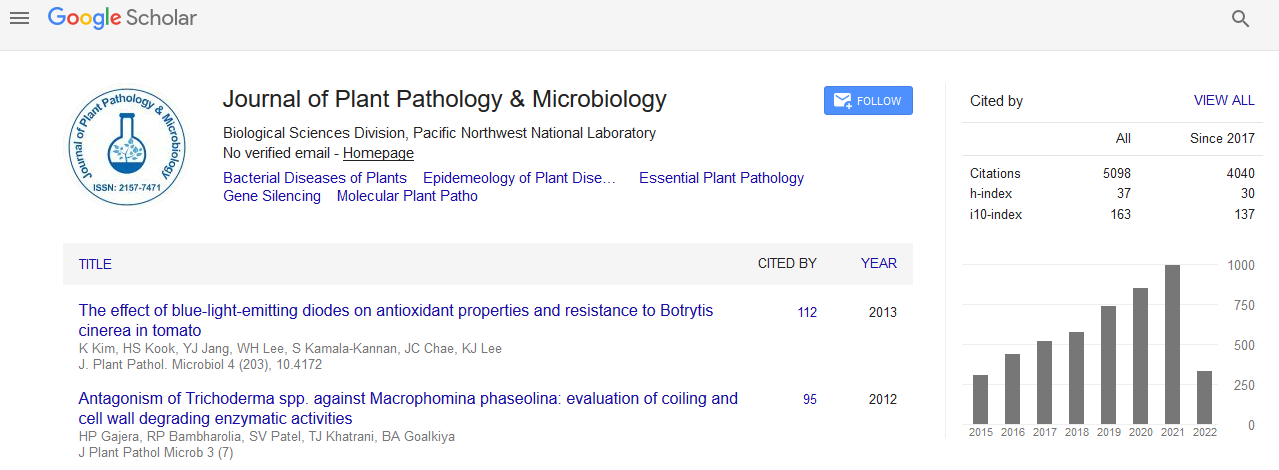PMC/PubMed Indexed Articles
Indexed In
- Open J Gate
- Genamics JournalSeek
- Academic Keys
- JournalTOCs
- CiteFactor
- Ulrich's Periodicals Directory
- Access to Global Online Research in Agriculture (AGORA)
- Electronic Journals Library
- Centre for Agriculture and Biosciences International (CABI)
- RefSeek
- Directory of Research Journal Indexing (DRJI)
- Hamdard University
- EBSCO A-Z
- OCLC- WorldCat
- Scholarsteer
- SWB online catalog
- Virtual Library of Biology (vifabio)
- Publons
- Geneva Foundation for Medical Education and Research
- Euro Pub
- Google Scholar
Useful Links
Share This Page
Journal Flyer

Open Access Journals
- Agri and Aquaculture
- Biochemistry
- Bioinformatics & Systems Biology
- Business & Management
- Chemistry
- Clinical Sciences
- Engineering
- Food & Nutrition
- General Science
- Genetics & Molecular Biology
- Immunology & Microbiology
- Medical Sciences
- Neuroscience & Psychology
- Nursing & Health Care
- Pharmaceutical Sciences
Cell and tissue specific regulation of sodium homeostasis conferring salinity tolerance in rice
2nd International Conference on Plant Science & Physiology
June 26-27, 2017 Bangkok, Thailand
Md Abdul Kader
Bangladesh Agricultural University, Bangladesh
Scientific Tracks Abstracts: J Plant Pathol Microbiol
Abstract:
Under NaCl-dominated salinity stress, Na+ is the primary cause of the ion-specific damage of many plants such as rice. Therefore, understanding the mechanisms of Na+ uptake and its accumulation in various tissues/ organs is very crucial for enhancing salinity tolerance in rice. In the study, we investigated the uptake of Na+ and K+ through root and their transport up to the leaf in salt tolerant rice cultivar Pokkali and compared with salt sensitive rice cultivar BRRI dhan29 using fluorescence microscopy and flame photometry method. Both the methods confirmed higher uptake of Na+ in both root and leaf of salinity tolerant rice cultivar as compared to the salt sensitive one. Salinity stress also induced higher uptake of K+, partcultarly in the salt tolerant rice cultivar. Through inhibitor analysis it was found that high affinity potassium transporters play significant role in uptake and transport of Na+ in rice, especially in the sensitive cultivar. However, an upragulation of OsHKT1;5 gene in response to salinity stress in the salt tolerant rice cultivar but not in the sensitive one indicates its significant role in recirculation of toxic Na+ ions from plant cells into the environment. Moreover, plasmamembrane Na+/H+ antiporter gene OsSOS1 and tonoplast Na+/H+ antiporter gene OsNHX1 and 2 were also unregulated several folds under salinity stress in the salt tolerant rice cultivar as measured by semi-quantitative RT-PCR and qRT-PCR. Upregulation of the genes under salinity stress was also found in the salt sensitive rice cultivar but not as high as in the tolerant one. The results suggest that salt tolerant rice cultivar Pokkali restricts the uptake of Na+ into the roots and its transports into the shoot, and once Na+ enters into the cell it is transported back into the apoplast and/or compartmentalized into the vacuole conferring better salt tolerance.
Biography :
Md Abdul Kader has more than 21 years of teaching and research experience related to stress physiology of crop, in particular salinity stress physiology in rice. Educated at Bangladesh Agricultural University (BAU) and Swedish University of Agricultural Sciences Professor Kader has been working at BAU since 1996. He worked as a postdoc in Okayama University, Japan and Stockholm University, Sweden. He was a guest researcher in the University of Bielefeld, Germany and Visiting Professor in Stockholm University, Sweden. He has already supervised more than 60 MS students and three PhD students. Currently five PhD students and six MS students are working in his group. Professor Kader and his group are currently trying to develop salt tolerant transgenic rice. Moreover, research priority is being given to improve the productivity of the cropping systems in the salinity affected coastal area of Bangladesh through suitable crop selection and improved management practices.
Email: abdul.kader@bau.edu.bd


